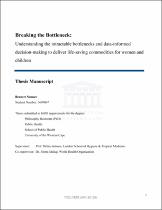| dc.description.abstract | Access to life-saving commodities and related services for women and children is a fundamental
component of universal health coverage. However, countries confront numerous intractable
challenges, such as aligning regulatory practices, enhancing health workforce capacity, and effectively
managing supply chains, to ensure essential reproductive, maternal, newborn and child health
(RMNCH) commodities and services reach all communities. To address these entrenched obstacles,
the UN Commission on Life Saving Commodities for Women and Children (UNCoLSC) in 2012
outlined a series of recommendations to improve access to 13 low-cost and high-impact commodities.
This thesis explores the improvements and remaining barriers to accessing life-saving commodities for
women and children in sub-Saharan Africa and Southeast Asia. In addition, this thesis showcases how
effective data-informed decision-making can support prioritized RMNCH investments and equitycentered
action. | en_US |

